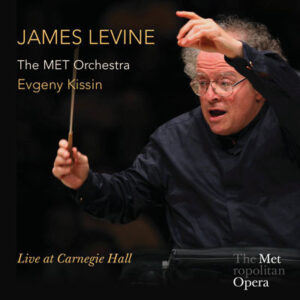The MET Orchestra’s Carnegie Hall concert on May 19, 2013 marked James Levine’s return to the podium after a two-year absence due to health issues. Although Levine’s limited mobility made it necessary for him to conduct from a wheelchair, he was all there from the waist up, so to speak, and his orchestra seemed happy to have its music director back.
The soft sustained string passages that open Wagner’s Prelude to Lohengrin Act 1 are shapely as well as shimmering. Evgeny Kissin turns in a tighter, more cohesive and poetically inflected Beethoven Fourth concerto than in his recent EMI recording with the late Colin Davis, who tended to accommodate his soloist’s ruminative whims in contrast to Levine’s firmer, forward moving orchestral framework. In turn, the MET Orchestra’s unison strings at the second movement’s outset project more tonal intensity and character in comparison with Levine’s earlier live recording with the Chicago Symphony and soloist Alfred Brendel.
Kissin plays the common first-movement cadenza favored by Arrau and Schnabel, and ebulliently romps through his encore, Beethoven’s “Rage Over a Lost Penny”. Following intermission, Levine returned for Schubert’s Ninth Symphony, which happened to be the featured work on the conductor’s 1972 New York Philharmonic debut program. Was this planned, or merely a coincidence? In any event, Levine’s interpretation has grown swifter and more texturally varied since his well-played yet somewhat faceless Chicago recording from the early 1980s.
You hear this in the first-movement introduction’s supple triplet accompaniment and insidious acceleration into the Allegro ma non troppo. The Andante is truly “con moto” here, while the lithe Scherzo features sharply pointed rhythms, piercing accents, and snarling brass rejoinders. The finale’s strong, impeccably executed dynamic contrasts possibly reflect the ensemble’s prominence in the theater, while the extensive swirling triplet passages never let up in lightness and propulsion. In this context Levine’s broadening of the four unison C-naturals that introduce the coda packs quite a punch—Toscanini also took this liberty in his celebrated 1941 Philadelphia Orchestra recording.
While the engineering is not as vividly detailed as in DG’s earlier Levine/MET Orchestra studio productions, it still conveys an accurate impression of how well an orchestra can mesh with Carnegie Hall’s warm and resonant ambience. In short, this specially priced two-disc set documents both a personal and musical triumph.
































